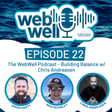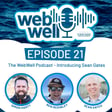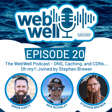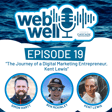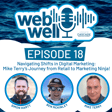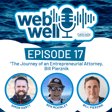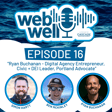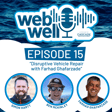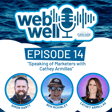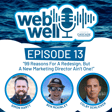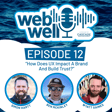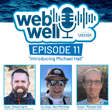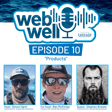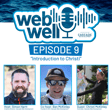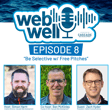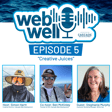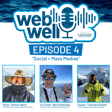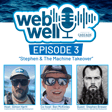Introduction and Episode Overview
00:00:06
Speaker
Welcome to the Web Well podcast brought to you by Cascade Web Development. I'm one of your hosts, Simon, along with Ben. And we can't wait to dive into all things internet, tech, web development, and web design.
00:00:20
Speaker
We'll also be discussing how we balance work and life and exploring the fascinating world of internet innovation. So whether you're a tech enthusiast or just looking for some entertainment, join us on this exciting journey as we explore the ever-changing landscape of the web. Thanks for tuning in and let's get started.
Special Guest Introduction: Paul Geiss
00:00:41
Speaker
All right, everyone. Welcome to episode number seven of the web well podcast brought to you by, I can't even talk yet. Let's, let's redo this and I may include it. Welcome everyone to the web well podcast episode number seven brought to you by cascade web development joined with me is Ben as always. And our special guest today is Paul Geiss. Hello, Paul. Welcome Paul. Thank you.
00:01:08
Speaker
Thanks for having pleasure. Yeah, just just so you know, listeners, he waved. So he waved as you as you were listening in your radios.
00:01:17
Speaker
Uh, Paul, welcome. I'm glad you're here. Uh, today's topic. Uh, we need your help. That's why we called you up. Uh, called you up as if like the big leagues, like you got called up Paul, um, to join us. So today's podcast, uh, we're going to talk about Google analytics, um, universal and more specifically GA four.
Paul Geiss's Career Journey
00:01:39
Speaker
Um, but let's start by getting to know Paul, Paul. Now do you tell us a little about yourself.
00:01:45
Speaker
I've been working with Cascade for either it's either it's just over 19 or going on 19 years. I don't exactly remember. I think it's going I think it's over 19 years now. Because I'm pretty sure okay, Ben's nodding. So that's I think so overnight sounds right. A long time. Yeah.
00:02:08
Speaker
So pause for a second. I realized, I realized this, uh, Ben, you were talking about your daughter's age being 17, right? Yep. Just turn 17. So I have a young child, but you guys all had kids prior to starting with cascade and now I have like families and we're looking at like college, right? Paul, like, did you have cat my youngest? Yeah. My youngest is just turned 18 and is graduating high school this, this week.
00:02:38
Speaker
And, uh, yeah, she's going to do community college, uh, PCC first, um, because they don't really know what, what careers interest them other than something in the arts. Um, but yeah, it's, it's, it's wacky to think that, oh, my, my son who was 21 was, was two when I started, which is at the interview. He's at the interview at Starbucks, I believe. And, and, uh, part of the reason you're somewhat delayed if memory serves.
00:03:06
Speaker
No, no, he wasn't. No, it was it was at a Red Robin in Vancouver. And no, I was delayed because of my son, but not I did not bring him with me. I was delayed because I had to wait for my wife to get home because also she had the only car we had.
00:03:22
Speaker
Well, and interestingly enough, to your point, Simon, the, you know, Stefan had a very young child, Paul, her young family. And I think that was one of the big draws with Cascade. At least that's my story. Sticking to that is that, you know, we had a number of young fathers that wanted to be pretty active in their kids' lives and work from home. So we started that right off the bat. And so when the pandemic hit, you know, whatever, 15 years later, it's like,
00:03:46
Speaker
This is all we know. So it was pretty familiar with our crew, but yeah, it's been really fun watching young families get older and going through those chapters together.
Technical Evolution and Work Culture
00:03:56
Speaker
Yeah. And I met previous to Cascade, I met Stefan in my first real tech job at a company called Bicell Bid, which has long been defunct now. But at the time, his son was, I think, one and a half or two years old.
00:04:13
Speaker
uh, when I met Stefan and he just turned 25 now, I think. So it was like, wow. Okay. That's weird.
00:04:23
Speaker
Um, but, uh, yeah, I started, I started being just an HTML monkey, uh, uh, making banner ads and, uh, doing some basic Photoshop stuff. And the, uh, it's actually kind of funny because I started doing like analytics and measuring user interactions at buy sell bid because we were using another company for it. And, uh,
00:04:45
Speaker
At the time, there was no kind of mechanism to do that. So we had to, again, create these tools to measure these metrics. Who's coming to our site? What ads are they clicking on? So that we could see which markets were at full saturation, which ones needed more pushback, because it was a lot to do with radio advertising as well. So they needed to pour more money into different markets. And funny enough, I can't remember what they call it, Black Tuesday, Black Monday, something like that.
00:05:14
Speaker
Everything on the internet went just downhill overnight. Um, it was, uh, it was funny. I mean, Stefan and I recall, uh, call it the pizza, the great pizza party. Cause, uh, everybody got pizza who was getting laid off and we were treated to the, the, the best buffet that the, uh, the Vancouver Sheridan had to offer. Um, and, and it was like 75% of the company disappeared. Um, and eventually that got whittled down some more.
00:05:42
Speaker
But after, after that, I got a job in Silicon Valley at a company doing kind of what I do now, just kind of the odd jobs. You're like, Oh, we need a developer to do this thing. Yeah. Okay. Great. And I was still like 19, 20 and didn't really think, Oh, that's impossible. Yeah. You can't do that. This was like, yeah, sure. I'll figure out some way to do it. And, uh, it was the most like MacGyver solution you can think of sometimes.
00:06:11
Speaker
but it got the job done.
Google Analytics Evolution: GA3 to GA4
00:06:15
Speaker
So that's what my boss is at the time we're looking at. And I was there about a year, almost two years before moving back to the Pacific Northwest to be closer to my wife's, I got married, we got married, and then we moved back to the Pacific Northwest to be closer to my wife's family. And I continued to do the kind of odd tech jobs for another year until Stefan called me out of the blue
00:06:41
Speaker
um, with an actual like phone call, uh, which was weird. Um, but, uh, he, uh, was like, Hey, are you still like developing stuff? And I'm like, yeah, like, Hey, great. Uh, I need you to meet this dude and me at this place. And, uh, because we need some help.
00:06:59
Speaker
And at the time, there was more work that Stefan could handle, which is always a good thing, unless you actually can't get the work done. So they hired me on a contract basis. And from there, it grew to more like an hourly basis. And then it grew to full-time salary position.
00:07:21
Speaker
I for a time I had business cards, but you know that the time of the business card has since passed us so now we don't do that anymore but. Since 2004 i've been working with with cascade still doing kind of a lot of.
00:07:37
Speaker
odd jobs. I mean, you call it odd jobs wearing mini hats. Some of it's like DevOps for maintaining our web servers. Some of it's front-end development, back-end development, middleware development, connecting to APIs. I could literally go on for three or four days.
00:07:56
Speaker
because clients call us and they're like, hey, we wanna do this thing. And we're like, yeah, okay, let's do that thing. And- So yeah, mini hats or Swiss Army knife, right? But I will say that that Swiss Army knife has way more tools in it. And the odd jobs you're doing are incredibly complex, robust web solutions serving huge user bases. So yeah, don't undersell yourself too much, Paul, but it's been pretty amazing seeing that evolution over time, no doubt about it.
00:08:27
Speaker
Yeah, there's definitely definitely been some some fun bits that were were possibly mind numbingly complex in nature. But with my okay, what's the easiest way to do it like the Bill Gates was like, if you have a job, give it to a lazy person. They'll find the easiest, most efficient way to do it. While I don't consider myself lazy, I do try to find that that the quickest, easiest, fastest solution to get the goal you want.
00:08:55
Speaker
And thankfully the mentality of nothing is quite impossible. It's just kind of difficult to do. I've been able to maintain that throughout my career for hopefully the benefit of all of our clients because we've had some really odd requests come through and they were like, I'm not sure this is possible. And I was like, hold my Portland craft beer while I figure out your problem. And thankfully that's gotten a very positive response from our clients.
00:09:24
Speaker
Nice, very nice. Well, two things. One, business cards are still a thing. We don't use them often. I had to print these up for an event that I went to for, we were doing portfolio reviews for students here in Spokane.
Importance of Google Analytics for Non-E-commerce Sites
00:09:42
Speaker
And so we did get some business cards. If you ever need some, I'll send the file to you, Paul, and you can get them printed. But yes, definitely.
00:09:52
Speaker
a difference in how we do business now, right? But speaking of that difference too is one of the tools in your quiver, if you will, Paul, the one that we look to you for is Google Analytics. And so we'll dive in on the topic because I think it's a big one, but more specifically, it's timely. There is a time crunch on some of this. And so we thought we'd
00:10:17
Speaker
get this out for listeners, share it via email on socials, try to get it out, see if we can just be a resource for people looking for information on this. So I think a good place to start would be what is Google Analytics? What is it that we've known Google Analytics to be? And I think we, I don't want to say, I think we've called it, you've called it, we've called it Google Analytics Universal, right? Maybe you could tell us about where that is at now.
00:10:45
Speaker
and then kind of what this next step or evolution is to GA4. Yeah, the universal analytics is kind of a more of a broad term. So we just call it GAU or GA-U. Technically, it's called Google Analytics version 3.
00:11:01
Speaker
which is why now we have version four. Not like the Xbox naming where they have, hey, here's the Xbox one and then one X. Shouldn't it be two? So there's a reason it's called Google Analytics 4. It's the fourth version of their Analytics software package.
00:11:20
Speaker
The current version of GA3 slash GA Universal includes not only web metrics for who's coming to your website, but it also has a separate subsystem called Firebase to measure your app engagement too. So people who are navigating your business structure, your website, or your data structure through an app, you can measure those metrics as well.
00:11:46
Speaker
with Google Analytics 4, they took all of the things and smashed them into one product. So now, instead of having to track these things separately in different screens, you can find a user behavior. They enter your website, for example. They put a thing in their cart on the desktop version. And that same user can be tracked. When they switch back to their phone, they go to the website again. Oh, it's already in my cart. And they hit the purchase.
00:12:14
Speaker
With that kind of unification of all their products, you can track that whole user journey from start to finish, from start to sale, and see where they're going, what other things they might be looking at, and present it as a more unified format of reporting for more thorough than, oh, we had
00:12:34
Speaker
3,000 sales this month, but you could have 3,000 sales from 1,000 people because you have a popular product. That doesn't mean you had 3,000 visitors to the website. The new version lets you get more accurate in your user engagement and your user behavior tracking. It's a very broad explanation of things. You mentioned, and I know we talked about this in some of the prep, but you mentioned
00:12:58
Speaker
Right there. A lot of sales based kind of stuff is Google analytics appealing to non e-commerce websites too. I mean, we talked about some of our clients just being, you know, law firms, uh, health organizations and whatnot. Like what would it mean to them? Yeah. For the, for the solely information based ones that you want to get information out to people, you're a law firm and you want to, uh, promote your, your services, your healthcare organization, and you want to provoke your, your healthcare data. Um,
00:13:29
Speaker
or even if you're just running a blog and you want to promote, hey, there's this great new technology or whatever your blog is about and you want to promote those pages. Analytics is still useful to that because you can track your user engagement in the site. You can see how many people, as a rough measurement, you can see, oh, I posted this last week and 5,000 people read the article that I posted. And then you can see, oh, well, 4,000 of those people came through
00:13:57
Speaker
this third-party website. So I'm blowing up on this site, but they're not coming through and clicking on my site. Why? You know, maybe the link is hidden or it's something like that. So with that kind of data, you can infer what might be happening about why X is so popular.
00:14:13
Speaker
because of where they're coming from. You'd be like, oh, this portal needs to be made more obvious or more accessible so that you can get people coming from funneling in where you want them to come from. That's one example for the more information-based sites. I mean, it does appeal to sales-based sites because you can track, because if you sell somebody something, you want to sell them other things.
00:14:37
Speaker
So you can find that user looking at other items while they're making a purchase. They were interested in this item. If it was a t-shirt, why did they buy this t-shirt? But they looked at two others that were pretty much exactly the same. Why did they choose this one over these two? So maybe you can say, okay, we need to stop selling this brand because it doesn't sell.
00:14:59
Speaker
people look at it and they go away. I don't know. Maybe there is some extraneous reason why this shirt maker isn't popular anymore. So that's the kind of data, that's the kind of inference you can make from the data you're gathering on your users from that perspective.
00:15:13
Speaker
Okay. So yeah, it's in other words, it's taking that data and allowing people to optimize the site, make it more efficient, find out spots or popular pages, areas that a lot of visitors are going to so that they can actually put some energy and potentially even budget on those pages to better promote whatever they're selling or showing, right? Correct. I mean, there's lots of, from a technical standpoint, I guess I'll use the analogy of a hospital emergency room.
00:15:43
Speaker
They know that where their traffic is because during the day, not that many, but on a Friday and Saturday night, they have to have more staff on hand because they've seen traffic spike from all kinds of things. It's the same thing with your website. If you see your website have spikes in traffic, you can say, okay, if you run like an AWS Elastic System, you can, during those hours, put more reprocessing power into it so your site doesn't slow down.
00:16:10
Speaker
One of our clients does training services, very informational, but they do have times where they have literally hundreds of thousands of users on their site. And that's the time that we identified because, okay, here's this time where we need to give them more processing power to make sure their site doesn't slow down. And we can track that through an analytics report to say, okay, here's our traffic times.
00:16:37
Speaker
and here's where they're going on that site. They're using a very processor intensive, like if they're viewing videos, they're using a very processor intensive service, so we need to develop more resources to that or program it to have more resources in that. The same thing can be said for the
00:16:57
Speaker
popularity of a post or content that you're doing. So you can see, oh, this content I posted is quite popular. This one, not very popular. And you can see from like, and one example is a time on page. If you have a thousand word article and somebody spends two minutes reading it, they're not going to get past the second paragraph. So that means you can look at that thousand word document and be like, okay,
00:17:23
Speaker
Nobody's spending more than two minutes on the page. I can reword this to get more hook text in the first paragraph and get them more interested and more engaged. So you can use it to better format your content so readers stay longer and they get the information you want to present to them.
00:17:38
Speaker
Okay. And we were talking about if I could jump in with a quick question, you know, sometimes, sometimes Google is is criticized for making certain certain changes in some areas to drive more revenue in other areas of their business.
Integration with Google Services
00:17:52
Speaker
Do you feel like there's much of that going on here? Or, you know, how do we
00:17:56
Speaker
sort of help our clients understand where Google's being altruistic and just getting better at what they're doing with analytics and how much of that is also potentially a side benefit or reality that they're also trying to direct more business toward other Google offerings. Well, a couple things. One,
00:18:13
Speaker
People have to realize that Google itself is a business. And their business is to get more business. They have products like Google Ad placement, Google Adwords, which if you go onto your administration console in your Google Analytics, you'll see big old entries for Google Adwords and Adwords placement. And you can purchase those and track that data and its effectiveness through your analytics dashboard.
00:18:42
Speaker
They are providing a valuable service to see where your users are going, what they're looking at. But they are also, they are, I guess I would put it as loudly offering their services, but they're not pushing it on you.
00:18:57
Speaker
They're making it very easy to engage in their AdWords content or create a content campaign, but it's not required. Whether it's altruistic or not, that is not something I can properly judge. But if I ever have a spare $500 I'm going to put towards selling dinosaur themed hula shirts,
00:19:22
Speaker
Google makes it really easy to do so. And I can track the effectiveness of my campaigns. You laugh, but there's obviously a market for it because I am literally wearing one. So here we are.
00:19:34
Speaker
but they make it very easy to start that service and to track its availability. I mean, you can also track its effectiveness. You have an ad word on this site, hoolashirts.com, not really effective, but you go to cooldinosaurs.com and it's very effective. And you can see those kind of metrics. So you'd be like, you know what? I'm not going to advertise on this site anymore. I'm going to put all my advertising in this site.
00:19:57
Speaker
and double down on that so you can definitely make it very easy for you to start purchasing their services and they can track that information and they can give you the ability to track the effectiveness of those ads that you're placing. So at the end of the episode we'll have a link to the shirt that you're wearing then.
00:20:17
Speaker
and add that in there so that people can go get one, too, for all the listeners that can't. Well, if you had a website, you're saying it would be a disadvantage not to have Google Analytics on there.
Urgency in Switching to GA4
00:20:32
Speaker
And so I did a little homework of where it started, where Google Analytics started, how many sites are using it.
00:20:37
Speaker
And throughout the world, basically there's about 28 million websites that are using Google Analytics on their website properties and just out of the US alone, 4 million websites. So it would be a pretty tremendous disadvantage not to capture that data, that information to better optimize your site.
00:20:55
Speaker
So when would be a good time to make this switch? Say a website already has Google Analytics or GAU or needs to get it. When would be a good time to make that change? And I know we've used a couple of terms, upgrade or change too. What is the right word for that? Is it an upgrade? Is it a change? And when do they need to do this?
00:21:23
Speaker
I mean, the term upgrade means that they're changing the software they have and then making it better. This is definitely more of a switch because the GA3 and the GA4 data models are so vastly different. There's no way to import data from one system to another. So the best time to switch to using GA4 was really last year, last July or so, when we got that initial notice from Google saying, hey, we're going to sunset the service July 1st, 2023.
00:21:54
Speaker
And in 2021, that sounded like so far away. It's like, eh, we can worry about that a little bit later. But now that it is less than a month away, definitely the sooner the better. With a lot of our clients, we've been pushing them to upgrade. And many have been very receptive. Some have been a little bit slower to adopt. Moving to a GA4 service, some are still using both services.
00:22:21
Speaker
because they wanted to keep their data consistent and have some historic data when they're looking at their reports. So when they see, oh, this report says I had 35,000 visitors last month, why does this report say I only had 2,000? It's like, well, because you installed this new code like the last week of
00:22:40
Speaker
you know, May. So those numbers are low. But getting that historic data so that they can see, and historic data really only applies really the last six months or so, because websites change fairly often. And even our own website gets updated regularly, you know, once a month, maybe once every other month. So metrics can be expired very easily because that page doesn't exist anymore.
00:23:10
Speaker
or they're going along a different path to get to the page you want them to go to. I mean, the answer was when Google said we're sunsetting the services, but the answer today is today. Log into your account. Google does make it easy to create your GA4 account, and it will be a separate account. So right now you log in, you see your website name or your project name,
00:23:37
Speaker
And then you have all website data and your little code right there, and that's where your analytics live. In GA4, you have a duplicate of that top-level block, and now it just says dash GA4 to differentiate from what it is. And then all your reports are directly accessible through that property. So they also, in GA4, they changed how it's structured as well. So you could have
00:24:01
Speaker
multiple instances previously for all website data. You could have truncated data for a specific view because you want to adjust marketing information. You want to adjust sales information so you could create all these different channels. Now in order to do that GA4, you'd be creating different customer reports for that. So you can see your sales data or your marketing data in that fashion instead of a whole other channel.
00:24:24
Speaker
Okay, so that ends a lot of the difference. Well, Paula, people are curious on like, what are the next steps?
Setting Up and Customizing Google Analytics
00:24:30
Speaker
I mean, I don't know, listening to you talk about this, the ins and the outs, I guess I'd feel most comfortable talking to you first. But is it something where clients can feel or web property owners can feel empowered just to hop in and make this change? How user friendly is that experience?
00:24:47
Speaker
Again, Google is a business and they want to make it as easy as possible for you to start using their services. So setting it up is pretty straightforward. It's pretty simple to do. And if all you want to do is see how many hits your homepage is getting, how many visitors are coming to your site, how many are new versus returning, that process is fairly simple and I'd encourage anybody to explore it. The trick is you have goals you want to accomplish.
00:25:16
Speaker
and getting the data to report in the fashion that supports those goals is where more advanced Google Analytics reports would come in, where more expert advice would come in.
00:25:29
Speaker
We have one client who has a fairly involved request because they want to see greater than the default. They want to see like six or seven levels deep of where users are going on their site from the homepage to this page. That's not in a standard report. That's definitely a custom report that we're working with them to create. If you need something along that nature that
00:25:55
Speaker
might be a little difficult to find when you're creating a custom report. And if you're creating a custom report, that interface does look a little intimidating. There are a lot of empty boxes. There are a lot of drop downs. And there are a lot of terms, which even sometimes today I have to go, it's like, what does that term mean? Oh, that's what they're talking about. Okay. It used to be called this, but now it's called this.
00:26:14
Speaker
So kind of initial registration, get it set up, then they can hand the code over to us. We drop it in the website, but to the extent they want to start doing some of these custom event tracking setups and the like, I don't know, for me personally, that's where I'd probably call you and say, Hey, Paul, how do we get from here to there? What options exist? Um, does that sound about right? Yeah. And, and the, uh, the other thing is that a lot of websites you leverage the Google tag manager so you can create your own custom events and your own custom tags.
00:26:44
Speaker
And then that adds another layer of complexity if you're using it for specific campaigns for some reason. If you have a lot of events for your nonprofit organization and you have a lot of events for a certain charity or something like that, you're sending out marketing emails. So you have not only a custom campaign that you're working, but you also might have custom events too.
00:27:08
Speaker
link to that for whatever you want to track. And then those events can be tracked in the Google Analytics. But if you want to make a custom report with using those custom events that are coming from this other Google system, that can get a little hairy.
00:27:21
Speaker
I bet. Well, and just to clarify, Paul, when you talk about a nonprofit that hosts a lot of events, be them virtual or in person, and then custom event tracking in Google Analytics, are those the same thing? I was that's, that's a good question. And I'm sorry to not clarify. I meant like if somebody has an event like a barbecue, that kind of event, they're making a barbecue and then the custom event tracking is is
00:27:46
Speaker
when somebody does an action on your website, that triggers that event. So then just coming to the page, that would trigger an event. If they click on a certain link, you can have a custom event for that link so it's tracked because that might go to an external registration form or might go somewhere else on your site. So you can get really nitty gritty about what users are doing on this web page for this barbecue and see what they're doing and what they're clicking on because they can be like, oh,
00:28:16
Speaker
they click this first button. But then, weirdly, they click back a bunch of ways. Well, that could indicate that people are clicking that button and they don't mean to. It's just the first button because our brains are like muscle-memored into saying, oh, this must mean register. It's like, oh, that's not it back in. Oh, here's the register button.
00:28:33
Speaker
Yeah. It's almost like Google has co-opted the term event into a new form of jargon, where in this case event, my understanding is it's user activity, a desired user activity, a series of steps, which can easily get confused with if you're hosting events and promoting events on your website. So a good, good point of clarification there for sure.
00:28:55
Speaker
Yeah, and that's the heart and soul of GA4 is events. Every time somebody does something in your website, they come to your website, they pull up the homepage, that's logged in as an event. They click on a link, that's an event. They fill out a registration form, that's an event. And it could be a conversion if you have some custom tracking set up, you know, because you want people to sign up for your newsletter. And who doesn't? You want people to get your newsletter? If your goal is to have people sign up for your newsletter,
00:29:22
Speaker
in Google Analytics, that could count as a conversion because that's the whole point of it. So you can measure, oh, I sent out this marketing email with this campaign to people. They did click on my link and they pulled up a page and 75% of them filled out the marketing newsletter form so that you can measure your engagement based off all of these events that people are doing as soon as they click up and pull out your website and where they're going in your website. And ultimately, if they fill out your registration form or if they click a link that you want them to click,
00:29:50
Speaker
So it's interesting. So Paul, do you feel like they've basically changed the term conversion to event, or instead of that, are we talking, I hate to get too far in the weeds, but are a series of events leading to a conversion, right? Are those synonymous terms or slightly different in all the research and the work that you've done around this? The client or the site owner, they can decide what a conversion looks like.
00:30:16
Speaker
If a conversion is just pulling up our email marketing newsletter to read this article that somebody wrote, that could technically be called a conversion because they clicked the link and they read the article. You can set it so that if a conversion is that they spend more than five minutes on the page, which means they actually read the article instead of just pulling it up and then closing the window.
00:30:36
Speaker
that could be counted as a single conversion. So it's very much up to the site owner what they want a conversion to look like. And the term conversion is a little bit confusing because I actually don't recall where the term came from, but analytics started using it long ago because they wanted to convert leads into sales. So that's where that term came from. It's like GA1. And the term has just stuck around.
00:31:03
Speaker
Yeah. Okay. So conversion is sort of a throwback. Yeah. Throwback to oftentimes a more transactional goal and events are perhaps multiple events can lead to a conversion. It's just kind of an evolution of turn. It kind of feels a little less transactional, a little more all encompassing would be my, my takeaway. Does that seem right?
00:31:23
Speaker
Yeah, and you can certainly also set goals, and they're actually labeled goals. So you can label goals to be like, oh, I want to increase sales from 20% to 22%, and it will track.
00:31:36
Speaker
you have to create this report to track what sales are over a period of time to see if you were meeting your goal. You can really get very deep in the weeds because you can have multiple funnels going into this goal of increasing sales. Because if you have multiple sales channels, you need to track all that data so that funnels into the right report. So probably be on the scope of this chat, but it's definitely something that can get very complicated very quickly.
00:32:06
Speaker
depending on not only the size of your business, but how many sales channels you have.
00:32:10
Speaker
and what your end goals actually are. Well, I think then would that probably lends itself more to the approach in some cases where it's cut and dry. Hey, we can set this stuff up for you and get you certain views and you're kind of standard. And then when you want to do some of these custom events, I think that's that area where it could be a little bit more of a consultative process when you do a little bit of research, a little less linear and obvious to work with.
00:32:36
Speaker
you know, the inputs of the website, the data sets, and then what Google's willing to do with those. Would now be a good time too to talk to the group a little bit about, you know, how the work you put into the Google Analytics module. Cause I know that for a lot of folks that logging into Google Analytics is a pretty terrifying experience, especially if you have multiple web properties and you're trying to drill into things. So it seems like a year or more ago now we started
00:33:04
Speaker
sort of harvesting these views, these reports, and creating custom dashboards within the Evergreen environment.
Evergreen's Custom Module for Simplified Analytics
00:33:11
Speaker
Do you want to kind of walk us through what's possible there? Yeah, at the start of the pandemic with that first lockdown, which I think was March or April? March, yeah. 2020 or 2021? 2020, yeah. 2020.
00:33:28
Speaker
There were a lot, I mean, as you said before, we've been working from our homes and been remote workers for, at that point, 16, 17 years. So while everybody was scrambling around for an external monitor and a microphone and a camera,
00:33:43
Speaker
which were in vastly short supply. And I sold an external monitor that I wasn't using to a guy for basically what would be retail for like a three-year-old monitor. I would have felt bad if I charged him more than retail, but I barely used it, so I didn't feel so bad. But that aside, one of our clients, I believe it was one of our clients, they basically said, it'd be really nice if I could view this in Evergreen. I don't like going to Google. I'm like, I bet that's possible.
00:34:12
Speaker
Oh, look, they have an API. Oh, look, they have software accounts I can use to run as a cascade service. It's like, hey, we have an analytics account for Cascade. Just add us to here, and then I'll just play with it a little bit. And a month later, the first evolution of that, that Google Analytics Cascade Evergreen module was born, and it was very well received.
00:34:42
Speaker
because it had a very specific purpose. The client wanted to look at very specific metrics. They wanted to see site visitors over time, noon returning visitors. Some of them are pretty basic. Some of them are a little more advanced. That took a little more effort to work out and work. And this at the time was using the GA version 3 interface and their API and working with all that data.
00:35:06
Speaker
And after that was created, the client was very appreciative of it. And we saw that this could actually be really useful to other people. And it's not meant as something better than Google Analytics, because it's not. It's just way more convenient to go and log into your Evergreen homepage and be like, oh, I had this many visitors yesterday. That's a nice number. That makes me feel good. And then I don't have to go through the entire
00:35:36
Speaker
permission process, which is kind of painful dealing with Google is their permission systems. But just seeing that report show up and like, hey,
00:35:47
Speaker
I see that over the last 30 days, here's my daily user right on the homepage. That's a useful metric for anybody. Yeah. Well, it feels very much like evergreen, right? Well, our goal is always give you exactly what you need and nothing more, very purpose-built. And so having that executive summary, and we've had it in the past where it's like, hey, our clients would be pouring a bunch of resources into, let's say,
00:36:10
Speaker
Google AdWords or whether it's paid search or organic search activity and then they would take their eye off the ball and maybe one little thing was off on the website and they weren't getting the full benefit. Well, sometimes that out of sight, out of mind can kind of harm us all. So if that's right where you need it when you log in, assuming the person who's responsible for
00:36:33
Speaker
those metrics are also responsible for administering the website. I've certainly had a lot of clients that were very excited about that function and really just scrubbing away all the Google noise that they don't care about, zeroing in on the things that they do care about. Then again, like Evergreen, over time, we can expand it, we can refine it, we can drill down further to get the event tracking that really is most useful to empower their business.
00:36:59
Speaker
Yeah. Yeah. And since then, I mean, we've expanded it also to now encompass the, the, the, the good GA4 API, that, that reporting API, there's a new SDK for their, for their framework that we have to add use to access the, the API.
00:37:16
Speaker
The kind of a hard thing, and this is true of anybody who's developing software based off of the analytics, is Google vastly changed how you access the analytic data. So metric names and dimensions, they call them dimensions and metrics, these names are no longer the same. And Google thankfully provided a chart of converting this name to this name. That was really useful, but also on the downside is they removed a lot of them.
00:37:44
Speaker
So some of the ones that we made reports for are no longer valid because GA4 just doesn't track that metric. So you either have to do without that metric or find a new way to derive the meaning you need from the data that's available.
00:37:58
Speaker
which is one of the things we've had to do recently for one of our clients because we had these five specific data points that they really, really enjoyed seeing reports for, but now we needed to create new ways and create custom queries of their available data.
00:38:15
Speaker
to get them the number they need to get you know oh what's this what's this bounce rate now because just ga comma bounce rate is no longer a metric for instance so we have to find out where people are leaving from in a more difficult fashion cool thank you yeah that's very helpful but i love the idea but as a module yeah i love the idea frustrating and fun to work with
00:38:37
Speaker
Yeah, I love the idea of someone logging in and seeing that scorecard just already on there. I mean, that is the site is seeing the traffic, the user ship, all those reports you spend that time in and then you log in and suddenly they're there, you know, without having to log into another site. Like you were talking about Google just kind of being difficult sometimes to get all the way into. So that's cool. Yeah, and it is meant for the mid, as you said, the mid to high level type of
00:39:05
Speaker
views of, okay, where's this going through? Because if you spend a lot of time in the evergreen admin and you, you sell, you know, widgets. Oh, how many people bought widgets? That could be a chart that you can see fairly easily.
00:39:19
Speaker
And instead of going to a whole other website, logging in, searching around for this, you can just go to, oh, analytics, and then, you know, view in the Evergreen interface. And then there's your sales of widgets. It's like, oh, great. We sold 300 yesterday, 250 the day before. And you can have this data that you need on your daily basis available to you through it.
00:39:40
Speaker
Well, recently we did a blog post about Google Analytics, about our module, about GA4. But what I see some homework for myself in the future is that what you were talking about, Paul, is these are the old Google Analytics terms.
Glossary and Differences Between GA3 and GA4
00:39:55
Speaker
Here's the new ones. I think just having a good little resource, maybe I can add that to this podcast description later on. But just like a little glossary of terms, because you're right. I mean, those terms, events, event tracking,
00:40:10
Speaker
goals. That's a huge one, and I don't remember from Google Analytics. So that's interesting. Yeah, and GA3 slash Universal was based off of sessions and page views. So you had a metric called page views. That's now changed to
00:40:32
Speaker
I might still be page use, but I don't know the metric name exactly. I mean, there's hundreds of metrics, so I can't remember at all. I do have that list bookmarked though, so I can look them up when I'm doing these versions. But the difference in GA4 now, it's all about events and parameters. So the page view is now considered just an event. So what's the event? Somebody viewed the page. What's the event? Somebody clicked the link.
00:40:59
Speaker
and also to comply with GDPR because Google is a global company.
00:41:07
Speaker
Everybody goes to google.com or google.co.uk to search for data, because they literally have indexed pretty much every website on the planet at this point. But the sessions used to use more than just what Google played with. So it could identify other partner websites that Google used. Now it's just one primary cookie that Google itself uses to track a user.
00:41:36
Speaker
If you are logged into your Google account on your desktop on your phone, which most people are.
00:41:42
Speaker
that data can be available to them so that they can track when you switch from your desktop to your phone to make that sale of that t-shirt. They don't know your name. They don't know your email address. They don't know your phone number or anything like that. But there is a randomized ID cookie because that's what they use. And that's the only thing Google uses is a cookie that they set. So that's the first party cookie they use, where previously they would use any data available.
00:42:07
Speaker
or other systems could use the Google cookie to identify users potentially if they were being malicious possibly. Okay, nice. Well, I guess to wrap it up, we keep having this kind of sense of urgency about now,
GA3 Discontinuation Reminder and Transition Support
00:42:23
Speaker
right? Do it now. What happens, what is the actual date, Paul? And then, you know, what happens to all that data after that date?
00:42:33
Speaker
So July 1st, I believe I said midnight of July 1st, your GA3 code on your website will stop accepting data. So it will cease functioning. It won't collect any more metrics. It won't collect any more data. And after that, your GA
00:42:54
Speaker
three dashboard will show no data, no users, no hits, no impressions, no sales, because it's stop tracking that data. And it will only start tracking GA4 data, which is why we kept telling clients,
00:43:09
Speaker
a couple of months before, install the GA4 code or create your account and switch to GA4 so you can see the historic data up until the very cutoff date. But you still will have access to your GA3 data up to a year. I believe I said a year afterwards, after the cutoff date. So also after the cutoff date, only GA4 code will start accepting user data.
00:43:33
Speaker
when people visit your site. So regardless, you need to update the code to start tracking user data. But if you are a week late or something or a day late, your data is not gone. It's just not being tracked. So after July 1st, your J3 data won't have anything in it. But if anybody has any qualms about it, it's just up right now.
00:44:01
Speaker
Yeah, technically upgrade last year, but upgrade now if you can. It should only take maybe 20 minutes, 30 minutes to go through the entire process from start to finish if you have to start from absolute scratch. So it's not difficult, just read the instructions and hopefully you have administrative access to your website.
00:44:25
Speaker
I know there are some platforms like WP engines, or if you have a WordPress site, or if you have an Evergreen site, you can definitely access the template. It's been a while since we created our own CMS. We use that. But I believe WordPress has either a plugin or some in-built tools to add Google tracking code to. So all you might need is the little code, the little number snippet.
00:44:54
Speaker
and it will add this code to the template automatically. I don't know if there's Wix and some other more WYSIWYG-based content management services out there. I don't know if you can modify the template, but they should have something similar so that you can add that tracking code to your Wix or whatever site it is so you can keep start tracking your user data. Perfect.
00:45:23
Speaker
Well, I think that that really shed some light on it for myself. I know that we've talked about this a bunch, especially of lately. So we will add in as I talked to Paul over the next day or two, we'll add in some some extra resources in there as we find those. But again, I think ultimately would be just start by by doing that change, making that update.
00:45:44
Speaker
uh, changing to GA four and then, yeah, or, or giving us a call, especially, well, you, you had me when you were talking about out of scope, like I could see myself even just making the switch. Sure. I could probably do that, but the custom event tracking and getting into those details, like that's well above my pay grade. So that's where I think it's been great to have you come in and step in with clients and be able to help support them.
00:46:10
Speaker
Uh, in, in create those and quite frankly, like research what they are, right? Cause it's not, it's not just here's your solution. It's let's figure out what the, what, what you're really wanting to track and how we can get that. And so there's a lot of custom is, is really what I've noticed. And so I feel like having a team having.
00:46:30
Speaker
Paul on your team is extremely helpful. So I appreciate your time, Paul joining us. Yeah. I mean, yeah, it's definitely something somebody can do on their self, but if you have more lofty goals, by all means, give us, give us a call or an email. For sure. Yeah. Well, in goals being one of the keywords with the new GA Fort. So plug there.
00:46:57
Speaker
Awesome. Well, thank you guys. Thanks for joining listeners as always.
Closing and Contact Information
00:47:01
Speaker
Thank you. Uh, we appreciate you following, liking, commenting. Um, and if you have any questions or any, uh, comments you want to add to the show, please email us at the web well podcast at cascade web dev.com. Uh, thanks for listening. Thanks, Paul. Thanks, Ben. We'll chat with you in another couple of weeks. Thanks everybody. Great job, Paul. Yeah.

